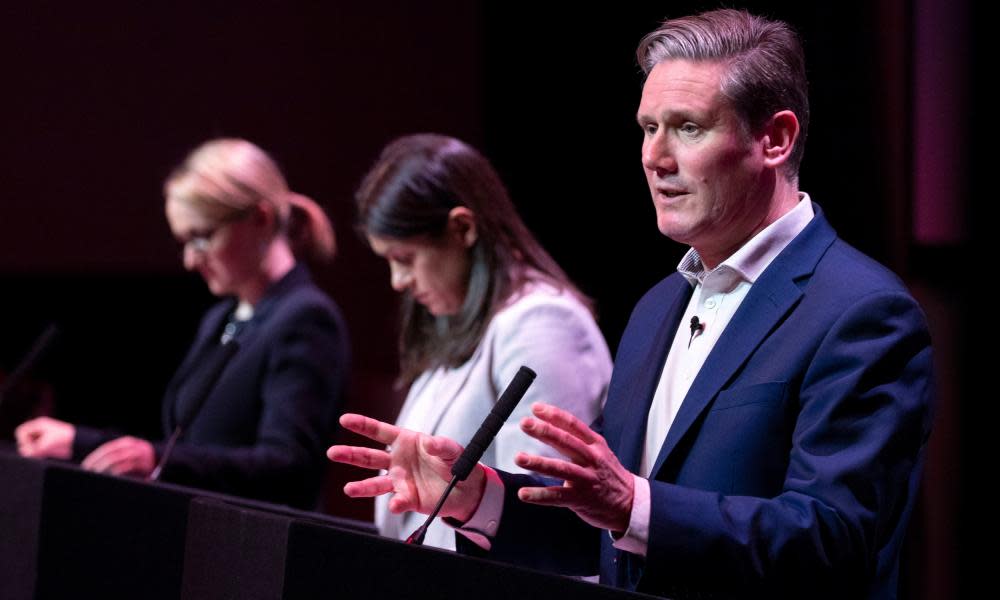The Labour leadership race matters – so why is it desperately dull?

The Labour leadership race is just entering its fourth decade. It is due to finish around the time the sun collapses into a black hole. OK, we’re three months in and it ends on 4 April, but time flies when you’re having fun, and quite obviously we aren’t.
The contest has not, it’s fair to say, been a classic of the genre. The 2010 race provided some fratricidal drama, thanks to the strangely widespread view that Ed Miliband was stealing a role that was his brother’s by right, as though the Labour party practises primogeniture. The 2015 version offered real ideological debate, between candidates of the left and right and two different flavours of continuity will-this-do-ism. Even 2016, as one-sided as it turned out to be, felt to some like a battle for the soul of the Labour party, and presented myriad opportunities for the electorate to discover embarrassing things about Owen Smith.
One plausible reading of last December’s election result is that a lot of people really wanted it to stop, actually
But this time, with the Labour party at its weakest in decades, it’s hard to discern what the race is about. In theory, Rebecca Long-Bailey is the candidate of the left and Keir Starmer of the right, but it’s surprisingly difficult to find matters on which they radically diverge – except for whether or not Jeremy Corbyn should have stepped down in 2016.
With Starmer, indeed, it’s hard to locate anything on which he holds a solid view at all. At least Lisa Nandy has spiced things up a bit by rising from nowhere using the clever strategy of actually being quite good on TV. But the fact that Emily Thornberry, not so long ago considered a frontrunner, could fall out of the race almost unnoticed is a measure of quite how little attention is being paid.
Why has the world stopped caring? Perhaps it’s because, for the first time since the single funniest moment of Theresa May’s career, the 2017 exit poll, Labour’s next shot at power feels a very long way away. Or perhaps it’s something else. Perhaps we’re all just tired.
Because last year, you’ll recall, there was a lot of politics. At the time this felt thrilling, but in retrospect it feels strangely pointless, a defunct hobby you’re embarrassed to have once been into. In March, my partner and I voluntarily spent an evening of our beach holiday watching John Bercow doing some shouting on BBC Parliament. The important thing about this story is not that I’m a massive nerd with whom you should never go on holiday, although clearly that’s true. It’s that, a year on, I can’t actually remember what these world-shaking events were. That evening, which felt so important at the time, has faded away, just another footnote in the never-ending news cycle that was 2019. I should have gone out and got drunk.
Last year was full of events like that, events that felt enormous then but seem quaintly irrelevant now. The late-night votes, through which the government could fall or Brexit could be blocked. The late-night speeches, for which May would make everyone wait around for an hour before saying nothing. The European elections, in which the Tories contrived to come fifth. The blue-on-blue warfare! The Lib Dem surge! Change UK! It. Never. Stopped.
Well: one plausible reading of last December’s election result is that a lot of people really wanted it to stop, actually. The Conservative party’s key campaign message, repeated more often and at higher volume than any other, was “Get Brexit done”. This took quite some chutzpah, but if your overwhelming priority was to return to normality, to put an end to the votes and the speeches and the instability – appealing to the group one might term the Brenda from Bristol voter – then on one level, it made sense to vote Tory. “Just give us what we want, and we can make this all go away” is, it turns out, a surprisingly seductive message, not just in organised crime, but in politics. The Lib Dems must be kicking themselves that they didn’t promote their plan to revoke article 50 under the slogan “Just make it stop”.
It seems that the lack of energy around the Labour leadership race is a sign that this apathy has even spread to that weird minority of voters who actually care about politics.
Related: Long-Bailey’s shift to attack mode shows what awaits Starmer if he wins | Patrick Maguire
But politics doesn’t stop. Boris Johnson’s government has threatened the existence of public service broadcasting, proposed ruinous immigration reforms, been accused of bullying its own staff, and refused to deny it believes in eugenics, and that’s just in the last fortnight. Labour is still the most plausible challenger to this government, and its agenda and its leadership team will affect its ability to hold Johnson to account.
So: the Labour leadership race does matter. It’s just a shame that the whole thing is so desperately, mind-numbingly dull.
Still. If the party wants to jazz things up a bit, I suggest compressing the months-long process into one evening of furious voting, broadcast live on Sky News with a commentary reminding us that, if this goes the wrong way, the entire economy will soon be plunged off a cliff. It’s worked before.
• Jonn Elledge is former assistant editor of the New Statesman

 Yahoo News
Yahoo News 
